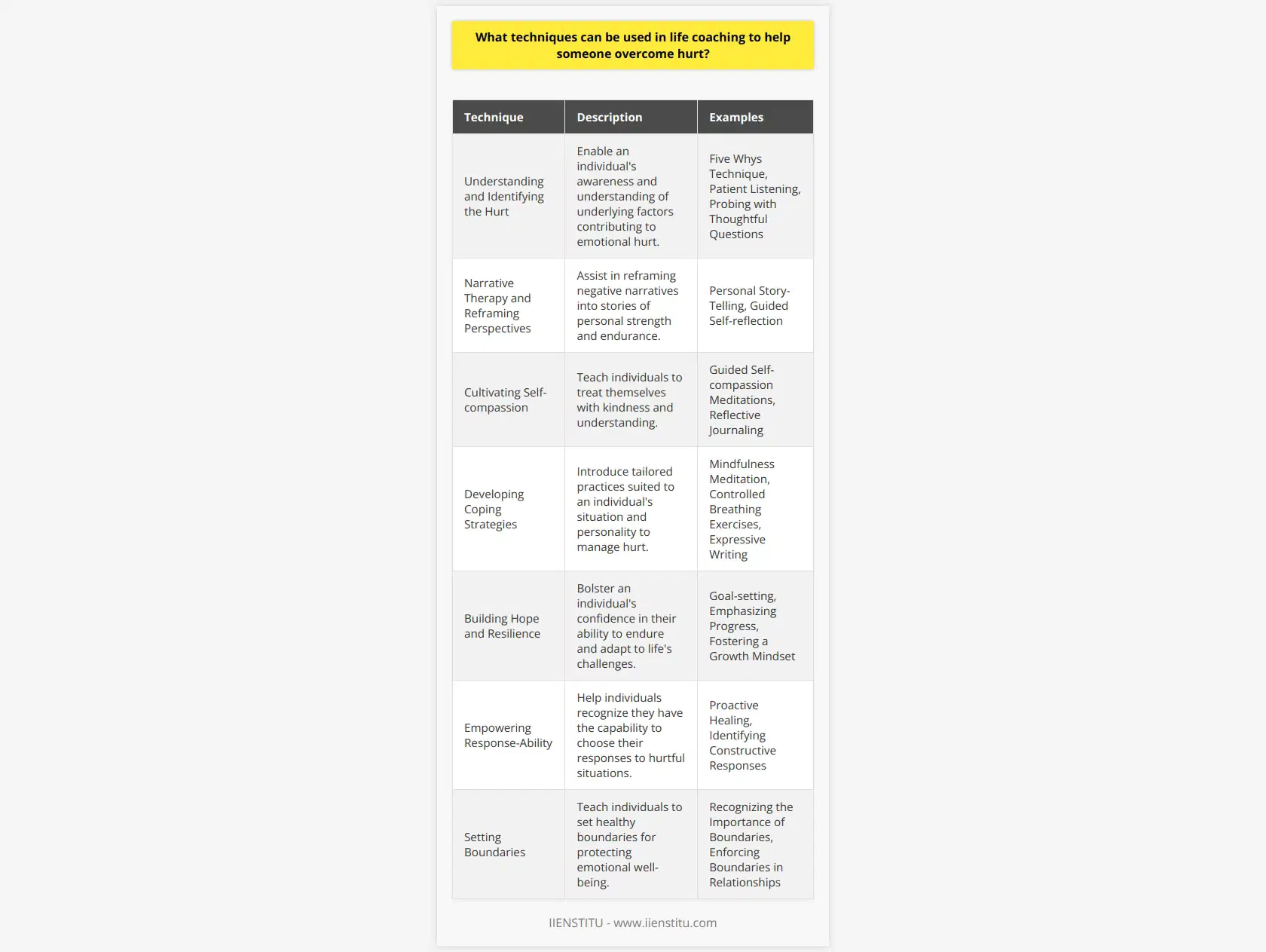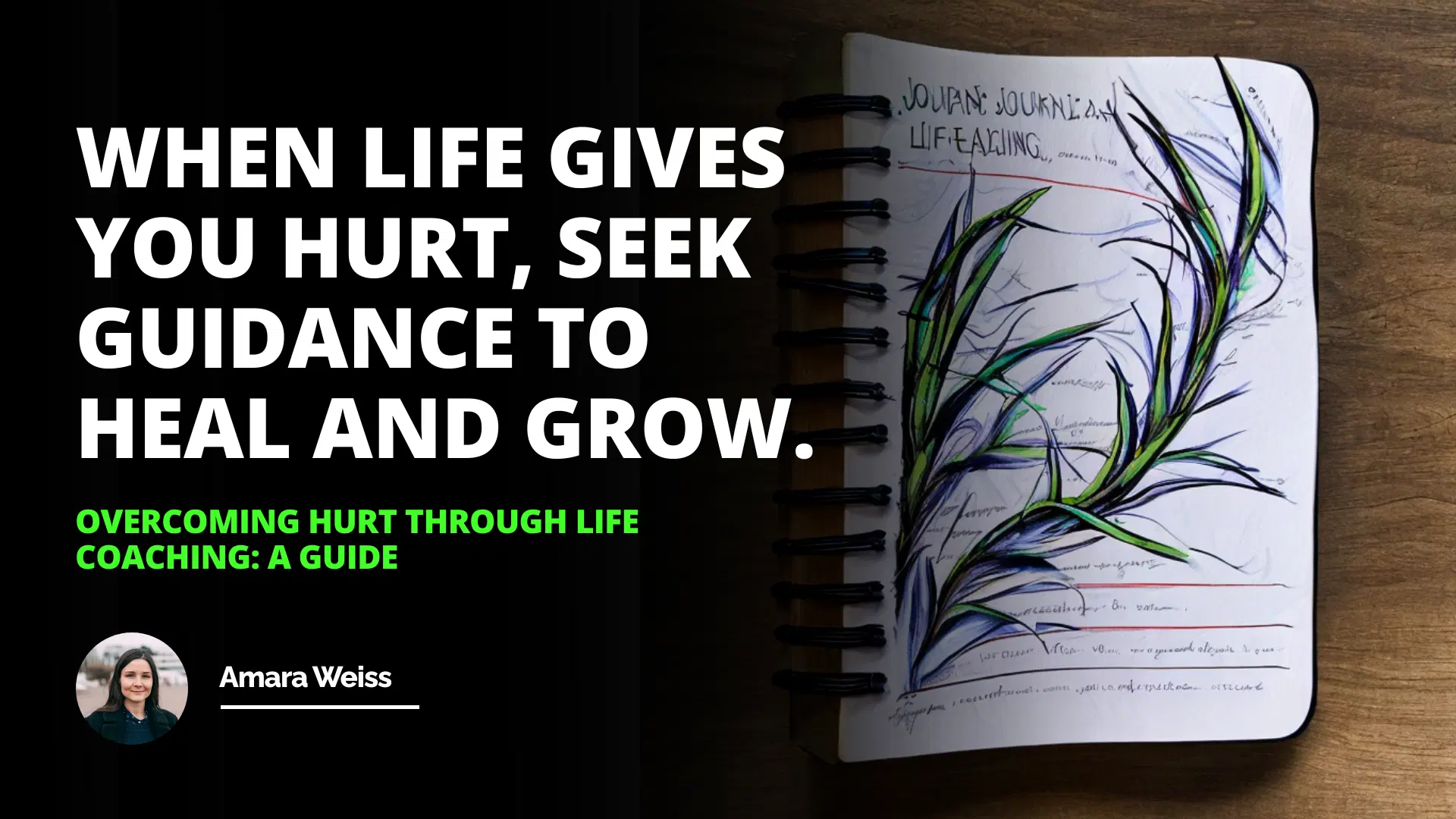
Life has a funny way of throwing us curveballs when we least expect them. I remember a time, not too long ago, when a close friend said something that cut me deep. It wasn't just the words but the weight they carried that left me reeling in emotional pain. We've all been there, haven't we? That gnawing feeling of hurt from a friend that settles in, making us question ourselves and those around us. But what exactly is this feeling, and how to cope with emotional pain?
Introduction
Definition of Hurt
Sulking as a Reaction to Hurt
Establishing the Facts
Overcoming Hurt Through Life Coaching
Understanding Hurt: More Than Just a Feeling
At its core, hurt is an emotional response to a perceived injustice or wrongdoing. It's that sting we feel when someone steps over our boundaries or when expectations aren't met. According to Dr. Brené Brown, a leading researcher on emotions, hurt often stems from unmet needs and unexpressed expectations[^1]. It's not just sadness or anger; it's a complex mix that can leave us feeling vulnerable and exposed.
The Layers of Hurt
1- Emotional Pain: This is the immediate reaction. The sadness, the tears, the heaviness in our chest.
2- Anger and Resentment: Often, hurt can morph into anger. We might feel angry at the person who hurt us or even at ourselves.
3- Withdrawal: Sometimes, the easiest reaction is to pull away. To build walls and avoid further pain.
4- Reflection: This is when we start questioning. Why did this happen? What does it say about me?
It's essential to recognize that feeling feelings is a natural part of the human experience. Suppressing them only prolongs the healing process.
Sulking: The Silent Reaction
Now, let's talk about sulking. It's not the most glamorous topic, but it's a reaction many of us are guilty of. Sulking is, in essence, a passive way of expressing hurt. Instead of confronting the issue head-on, we retreat into ourselves. Here are some signs you are sulking:
Silent Treatment: Avoiding conversations, giving one-word answers, or completely ignoring someone.
Negative Body Language: Slamming doors, heavy sighs, or avoiding eye contact.
Indirect Communication: Making snide remarks or dropping hints without addressing the problem directly.
I recall my cousin, Sarah, who would often resort to "silent sulking" whenever she felt overlooked. It was her defense mechanism, a way to shield herself from further hurt. But over time, it only created more distance between her and those she cared about.
Why Do We Sulk?
1- Fear of Confrontation: Facing the source of hurt can be daunting.
2- Desire for Attention: Sometimes, sulking is a cry for someone to notice our pain.
3- Lack of Communication Skills: Not everyone knows how to express hurt feelings effectively.
Establishing the Facts: The First Step Towards Healing
Before we can heal, we need to understand the root cause of our hurt. This means taking a step back and assessing the situation objectively.
When life gives you hurt, seek guidance to heal and grow.
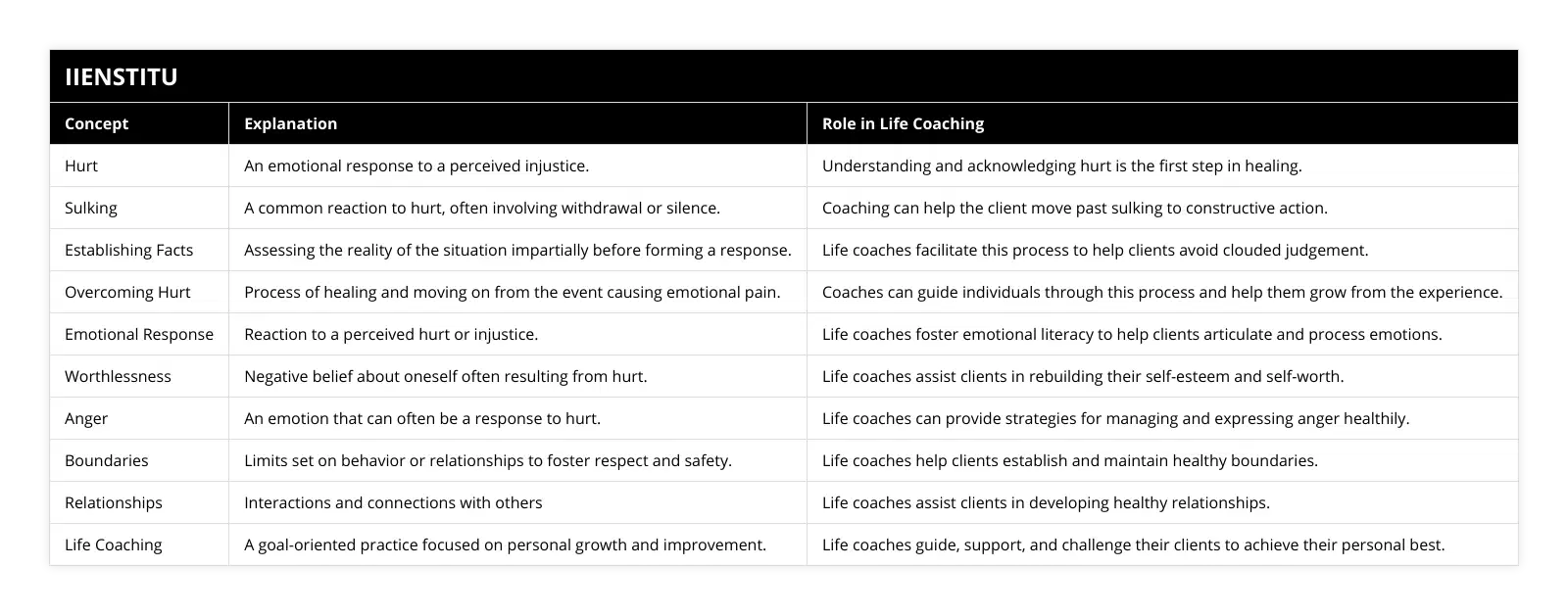
1- Identify the Trigger: What exactly caused you to feel hurt? Was it a specific comment or action?
2- Understand Intent vs. Impact: Sometimes, people don't intend to hurt us. It's crucial to differentiate between malicious intent and unintended consequences.
3- Self-Reflection: Are there past experiences influencing how you feel now?
4- Seek Clarity: If possible, have an open conversation with the person involved.
I remember a time when I misinterpreted a friend's actions. I thought she was avoiding me, but in reality, she was dealing with personal issues. Establishing the facts helped me see the situation clearly and prevented unnecessary resentment.
Overcoming Hurt Through Life Coaching
This is where the magic happens. Engaging with a life coach or even considering life coach certification can provide tools to navigate through hurt effectively.
What is Life Coaching?
Life coaching is a partnership between a coach and a client, aimed at helping the client achieve personal and professional goals. It's about unlocking potential and navigating life's challenges.
Coaching Definition
Goal-Oriented Guidance: Focusing on specific objectives, whether personal growth, career advancement, or overcoming emotional hurdles.
Empowerment: Equipping individuals with the tools to make informed decisions and take control of their lives.
Accountability: Providing a support system to keep clients on track.
Benefits of Life Coaching in Overcoming Hurt
1- Personalized Strategies: A coach tailors approaches to your unique situation.
2- Emotional Support: Having someone unbiased to talk to can alleviate feelings of isolation.
3- Skill Development: Learn effective communication, establishing boundaries to prevent hurt, and emotional regulation.
4- Perspective Shift: Coaches can help you see situations from different angles, promoting understanding emotional pain and hurt.
A Personal Journey with Life Coaching
A dear friend of mine, Mark, was struggling after a tough breakup. He felt lost and couldn't shake off the hurt. Then he decided to seek help from a coach who specialized in personal development. Through their sessions, Mark learned to:
1- Set Healthy Boundaries: Understanding his limits and communicating them effectively.
2- Process Emotions: Allowing himself to "feel feelings" without judgment.
3- Rebuild Confidence: Engaging in activities that reinforced his self-worth.
4- Develop Future Goals: Shifting focus from past hurt to future aspirations.
Today, Mark is thriving, and he credits much of his growth to the guidance he received from his coach.
Practical Steps to Heal from Hurt
While life coaching is invaluable, there are everyday steps we can take:
1- Acknowledge Your Feelings: Don't suppress or ignore them.
2- Practice Self-Care: Engage in activities that nourish your soul--be it reading, exercising, or spending time in nature.
3- *Journaling for emotional healing*: Write down your thoughts and feelings. It's a safe space to process emotions.
4- Seek Support: Talk to trusted friends or family members.
5- Consider Becoming a Certified Life Coach: If you're passionate about helping others, this path can be both healing and fulfilling.
The Role of Boundaries in Preventing Hurt
Establishing boundaries is crucial in maintaining healthy relationships and protecting our emotional well-being.
1- Identify Your Limits: Know what you're comfortable with and what crosses the line.
2- Communicate Clearly: Let others know your boundaries. Be assertive yet respectful.
3- Respect Others' Boundaries: It's a two-way street.
As the saying goes, "Good fences make good neighbors." Establishing boundaries isn't about keeping people out but about creating a space where relationships can flourish without undue hurt.
Embracing Forgiveness and Moving Forward
Forgiveness as a tool for healing doesn't mean forgetting or excusing harmful behavior. Instead, it's about releasing ourselves from the emotional burden of holding onto hurt.
1- Forgive Yourself: Sometimes, we blame ourselves for getting hurt. It's important to be kind to ourselves.
2- Forgive Others: Let go of grudges. It doesn't mean you have to reconcile but allows you to move forward.
3- Focus on Growth: Every experience, even painful ones, offer lessons.
Conclusion
Hurt is an inevitable part of life, but it doesn't have to define us. By understanding our emotions, establishing the facts, and seeking guidance--like that offered through life coaching techniques to navigate hurt--we can navigate through hurt and emerge stronger.
Life coaching provides tools and support to not only overcome hurt but to thrive beyond it. Whether you're seeking a life coach certification to help others or engaging with a coach for personal growth, the journey is transformative.
When life gives you hurt, seek guidance to heal and grow.
So, the next time life throws a punch, remember:
When life gives you hurt, seek guidance to heal and grow.
Embrace the journey, lean into your feelings, and know that with the right support, you can turn wounds into wisdom.
References
[^1]: Brown, B. (2012). Daring Greatly: How the Courage to Be Vulnerable Transforms the Way We Live, Love, Parent, and Lead. Gotham Books.
[^2]: Cloud, H., & Townsend, J. (1992). Boundaries: When to Say Yes, How to Say No To Take Control of Your Life. Zondervan.
[^3]: Whitmore, J. (2009). Coaching for Performance: GROWing Human Potential and Purpose - The Principles and Practice of Coaching and Leadership. Nicholas Brealey Publishing.
[^4]: Goleman, D. (1995). Emotional Intelligence: Why It Can Matter More Than IQ. Bantam Books.
Additional Tips
Engage in Mindfulness Practices: Meditation and deep-breathing exercises can help center your emotions.
Stay Connected: Don't isolate yourself. Community plays a vital role in healing.
Educate Yourself: Read books on emotional intelligence and personal development.
Remember, healing is not a destination but a journey. Be patient with yourself.
Frequently Asked Questions
What are the benefits of life coaching for overcoming hurt?
Life coaching has become a popular therapy for those dealing with personal issues, including hurt. It is a practical approach that can help individuals to navigate the psychological and emotional distress associated with pain. This article will discuss the benefits of life coaching in overcoming hurt.
One of the primary benefits of life coaching for overcoming hurt is that it helps individuals to understand the root cause of their pain. Through the coaching process, individuals can understand the underlying issues causing the hurt, such as unresolved trauma or negative thought patterns. This understanding provides an opportunity for individuals to begin the journey of healing and helps them to develop more effective coping strategies.
Another benefit of life coaching is that it provides a non-judgmental and supportive environment. This can be especially beneficial for individuals who have experienced hurtful experiences due to rejection or criticism. By providing a safe space, life coaching can help individuals to open up and discuss their feelings without fear of judgment. This can be an essential first step in the healing process.
The third benefit of life coaching is that it helps individuals to develop more effective and healthier coping mechanisms. By developing new coping strategies, individuals can learn to manage their emotions more effectively and be better equipped to handle future hurtful experiences. Life coaching can also help individuals to identify and address any underlying issues that may be contributing to their distress.
Finally, life coaching can help individuals to develop healthier relationships. Through coaching, individuals can gain insight into their attachment styles and learn how to build healthier relationships. They can learn how to communicate effectively and practice self-care to create a more positive and supportive environment.
In conclusion, life coaching is a practical approach to overcoming hurt. It can help individuals understand their pain, provide a safe and supportive environment, develop healthier coping skills, and foster healthier relationships. By utilizing these benefits, individuals can start the journey of healing and move forward in life.
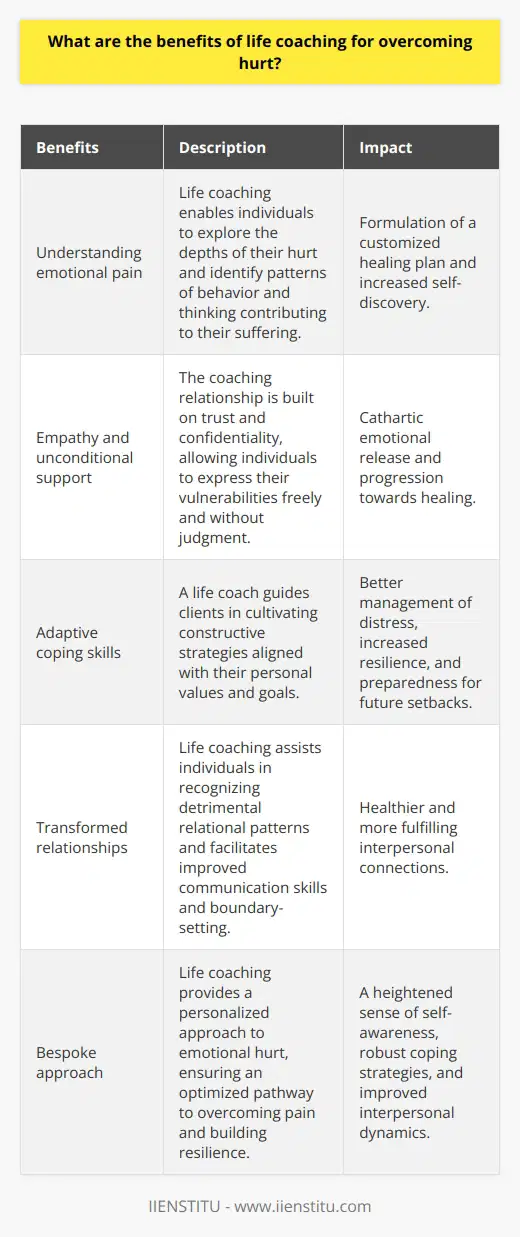
How can life coaching help to establish the facts of a situation?
Life coaching is an effective tool for helping individuals to gain clarity and insight into their situation. It can also be beneficial for helping individuals to establish the facts of a situation. Life coaching can be used to help an individual gain an understanding of their current situation, which in turn can help them to form a solid foundation from which to move forward.
The first step in using life coaching to establish the facts of a situation is to become aware of the current state. This involves looking at the facts objectively and determining what is true and what is not. Life coaching can help individuals become aware of their current situation and identify any areas where they may feel confused or uncertain. Once this awareness has been achieved, life coaching can then be used to help the individual to explore their options and to understand how their choices are impacting their current situation.
The second step in using life coaching to establish the facts of a situation is to identify the goals and objectives that the individual wishes to achieve. Life coaching can help individuals to identify their goals and objectives and to develop a plan of action to achieve them. This plan can include setting short-term and long-term goals, exploring different options, and creating a timeline for accomplishing the goals.
The third step in using life coaching to establish the facts of a situation is to create a supportive environment. This involves providing support and encouragement to the individual as they become aware of and pursue their goals. Life coaching can help individuals to develop the confidence and motivation necessary to pursue their goals and take action. This can include providing tools and resources to help the individual along the way, such as goal-setting worksheets and positive affirmations.
Finally, life coaching can help to establish the facts of a situation by helping the individual to assess their progress and make necessary adjustments. Life coaching can help individuals understand their progress and identify areas where they may need to make changes to reach their goals. This can involve setting new goals and taking steps to achieve them.
In conclusion, life coaching can be an effective tool for helping individuals to become aware of their current situation and to establish the facts of a situation. It can help individuals to identify their goals, create a plan of action, develop the necessary confidence and motivation, and assess their progress. Life coaching can be a valuable resource for individuals seeking clarity and insight into their current situation.
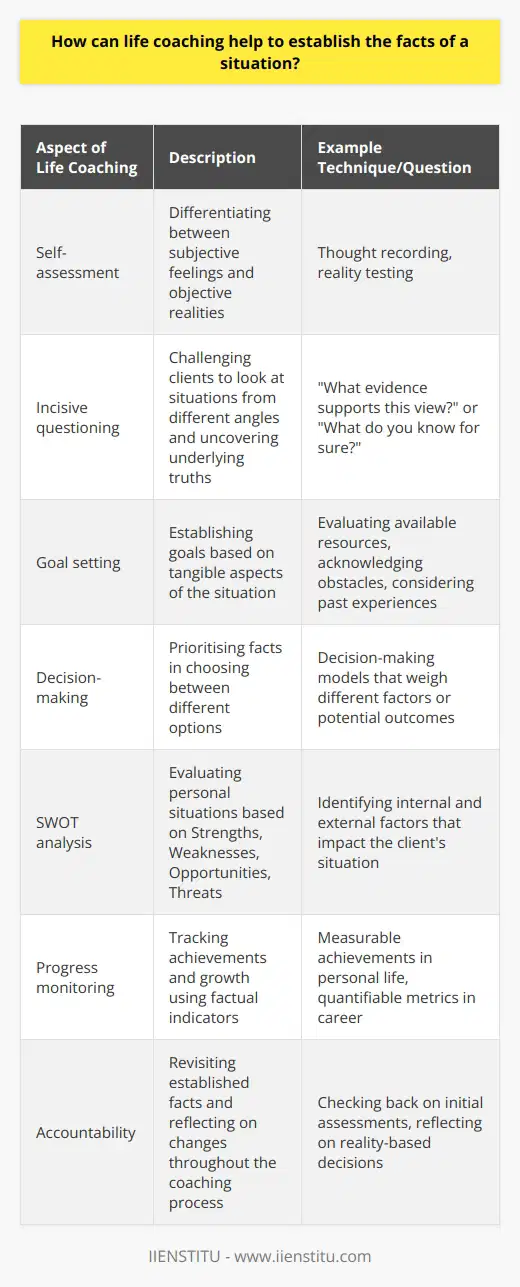
What techniques can be used in life coaching to help someone overcome hurt?
Life coaching is a powerful tool that can help individuals to overcome difficult emotions like hurt. Hurt is a unique emotion that can often be difficult to move past without the proper guidance and techniques. Here, we will discuss several techniques that life coaches can use to help individuals to process and heal from the hurt.
The first step in helping someone overcome hurt is to help them to identify the source of the hurt. Often, individuals may experience hurt without knowing the root cause. A life coach can help identify the source of the hurt to begin the healing process. Additionally, a life coach may help to reframe the hurt to create a more positive perspective. This reframing can help lessen the hurt's intensity and move the individual toward a more productive emotional state.
Another technique that can be used to help individuals to overcome hurt is to help them to develop a sense of self-compassion. Self-compassion can help individuals to recognize that their hurt is valid and recognize themselves as worthy of love and support. A life coach can help individuals develop self-compassion by providing understanding and reassurance. Additionally, a life coach can help the individual to develop new coping strategies to manage their hurt. This can include activities such as meditation, journaling, and visualization.
Finally, a life coach can help an individual to develop a sense of hope and resilience. By recognizing their strength and potential, the individual can move forward in life more confidently. A life coach can help foster this hope by providing support and guidance. Additionally, a life coach can help individuals recognize and celebrate their successes, no matter how small.
In conclusion, life coaching can be a powerful tool to help individuals to process and heal from the hurt. By identifying the source of the hurt, helping the individual to develop self-compassion, developing new coping strategies, and fostering a sense of hope and resilience, a life coach can help the individual to move forward in life with greater ease.
